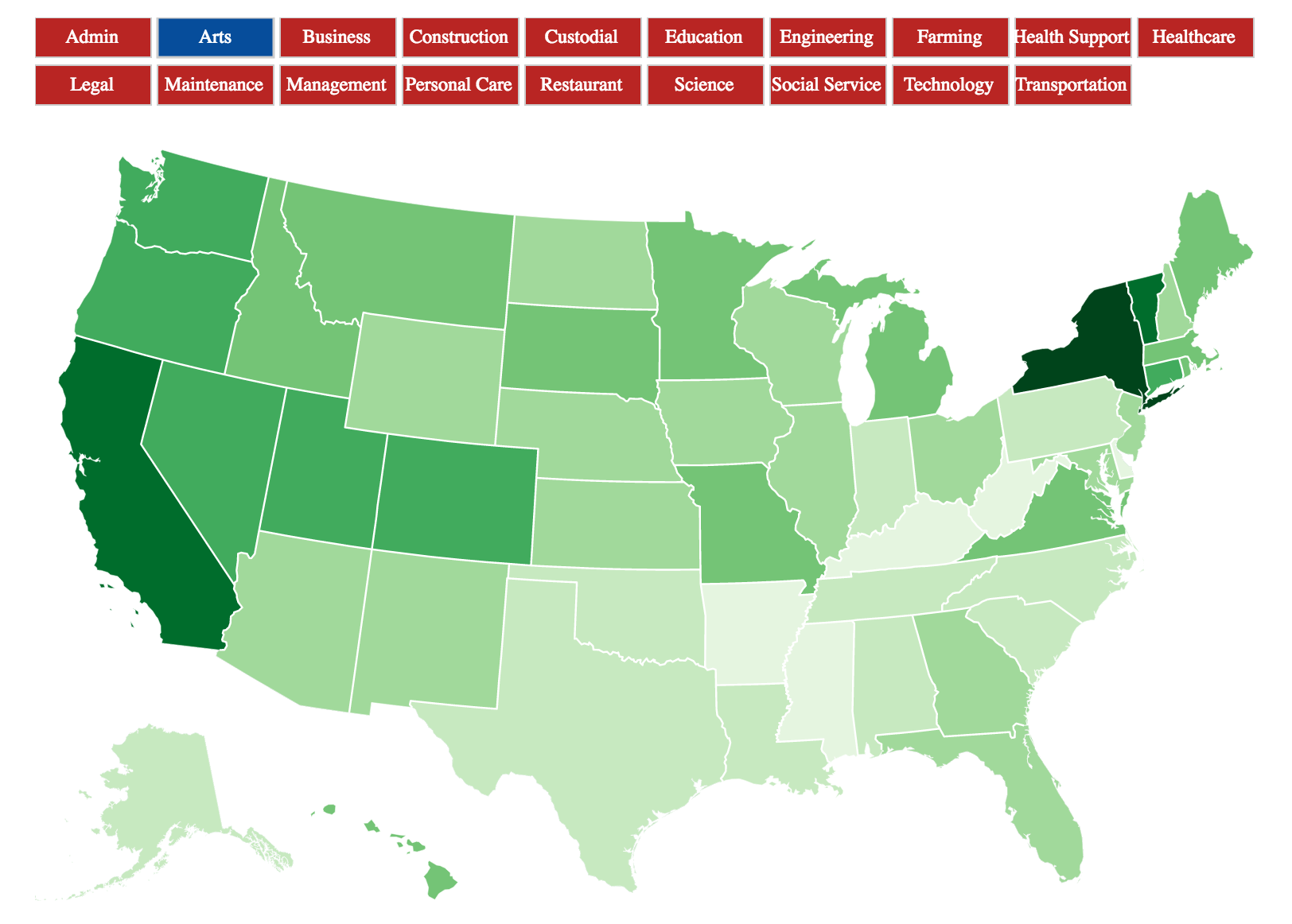The United States is an economic powerhouse. In 2016, the economy totaled almost $19 trillion, a number greater than that of the entire European Union even though the US has less than half the EU’s population. While the reasons for the country’s economic success are complex, one of the most critical factors is the specialization of regions. Almost everyone knows that Los Angeles, California is a hub for burgeoning actors, the finance industry is concentrated on Wall Street in NY and that tourists flock to Las Vegas, Nevada and all parts of Hawaii. But did you know that Virginia is a tech hub, Michigan has the highest relative concentration of engineers and West Virginia has more than its fair share of healthcare practitioners?
We didn’t either, which is why we mapped how jobs are concentrated across the US.
How the map works
For each state, we calculated the percentage of its working population that was employed in one of 22 occupation groups. For example, in North Dakota, 8.4% of the population works in Construction and Extraction. Next, for each occupation group, we ranked each state from 1 to 50 by their percentage. In Construction and Extraction, Wyoming is ranked 1st, with 10.4% of its working population employed in that group, and Illinois is ranked 50th at 3.0%. Finally, using the percentages, we created the Job Concentration Score, a number from 0 to 100 that we use to map the rankings. States that are colored in a darker green have a high percentage of their workforce concentrated in the occupation group (in other words, they have a high Job Concentration Score) whereas states colored in a light green have a low percentage of their workforce in the occupation group (a low Job Concentration Score).
Click the industry you want to explore and hover your mouse over your state to get started.
[d3-source canvas=”wpd3-1461-1″]
The highlights
After you’ve checked out the map, take a look at some of the most interesting highlights.
- It is unsurprising that the states of California and New York dominate jobs in the Arts, Design, Entertainment, Sports and Media group. As long as Los Angeles and New York City are considered the entertainment capitals of the US, artists (successful and starving) will continue to flock to these creative meccas.
- Architecture and Engineering jobs are most concentrated in Michigan for a single reason: the auto industry. Michigan employs more industrial engineers than any other state, many of whom work designing cars and parts. Despite this concentration, one analysis shows that Michigan still does not have a sufficient supply of industrial engineers to satisfy the carmakers’ insatiable demand.
- Jobs in the Building and Grounds Cleaning and Maintenance (Custodial) and Food Preparation and Serving (Restaurant) group are almost twice as concentrated in the states of Nevada and Hawaii as compared to the third-ranked state. Given their reputation as tourist havens, it is logical that an outsized portion of these states’ economies would be centralized in jobs that typically involve catering to a visitor population.
- Jobs in the Community and Social Service group are primarily comprised of counsellors and social workers and it is here where we see a great divide between the North and South. States in the North tend to have far higher concentrations of people working in these industries, a trend that is mirrored in other rankings that look at access to mental healthcare.
- Despite being home to Silicon Valley, the world’s largest concentration of high-tech businesses, California as a whole only ranks 7th for jobs classified as belonging to the Computer and Mathematical (Technology) sector. Virginia ranks first, with research spearheaded by NASA’s Langley Research Center driving impressive growth in the nanotechnology industry.
- In 2005, 29% of Wyoming’s GDP came from mining so it should come as no surprise that the state is the leader in concentration of jobs in the Construction and Extraction industry. As Wyoming has no personal or corporate income taxes, it relies almost exclusively on severance taxes from minerals to fund the state coffers. (On a related note, the state also dominates jobs in the Installation, Maintenance, and Repair sector, likely as a result of employing people to support the equipment required for mineral extraction.)
- Although agricultural production is spread across the US, no state comes close to California in concentrating its working population in jobs classified as Farming, Fishing, and Forestry. The ideal climate of the San Joaquin Valley allows the state to produce a variety of agricultural products and has led the region to be called “the breadbasket of the world”.
- The Northeastern US produces 23% of US gross domestic product (as of 2012), a disproportionate level of economic activity given its population. This is why this region has a relatively high concentration of jobs in the Legal sector as lawyers provide counsel to businesses.
- It does not seem that West Virginia has been efficient at delivering healthcare given that a significant percentage of its working population is concentrated in the Healthcare Practitioners and Technical Occupations group and yet it consistently ranks near the bottom of quality of healthcare analyses. One limiting factor in providing high quality healthcare in the state may be West Virginia’s rural population, which requires a greater number of healthcare practitioners on a per capita basis than most states.
- Alaska has the highest job concentration of jobs in the Life, Physical, and Social Science group, primarily because of the state’s emphasis on wildlife research. Alaska employs 730 zoologist and wildlife researchers, a number that is highly disproportionate to its overall population.
- The Personal Care and Service Workers group contains a variety of professions from embalmers to childcare workers but it is the gaming dealer and supervisor jobs that propel Nevada to the top of the list in this niche industry.



